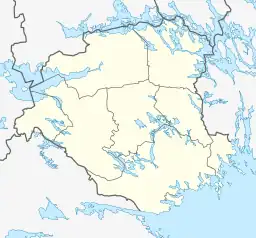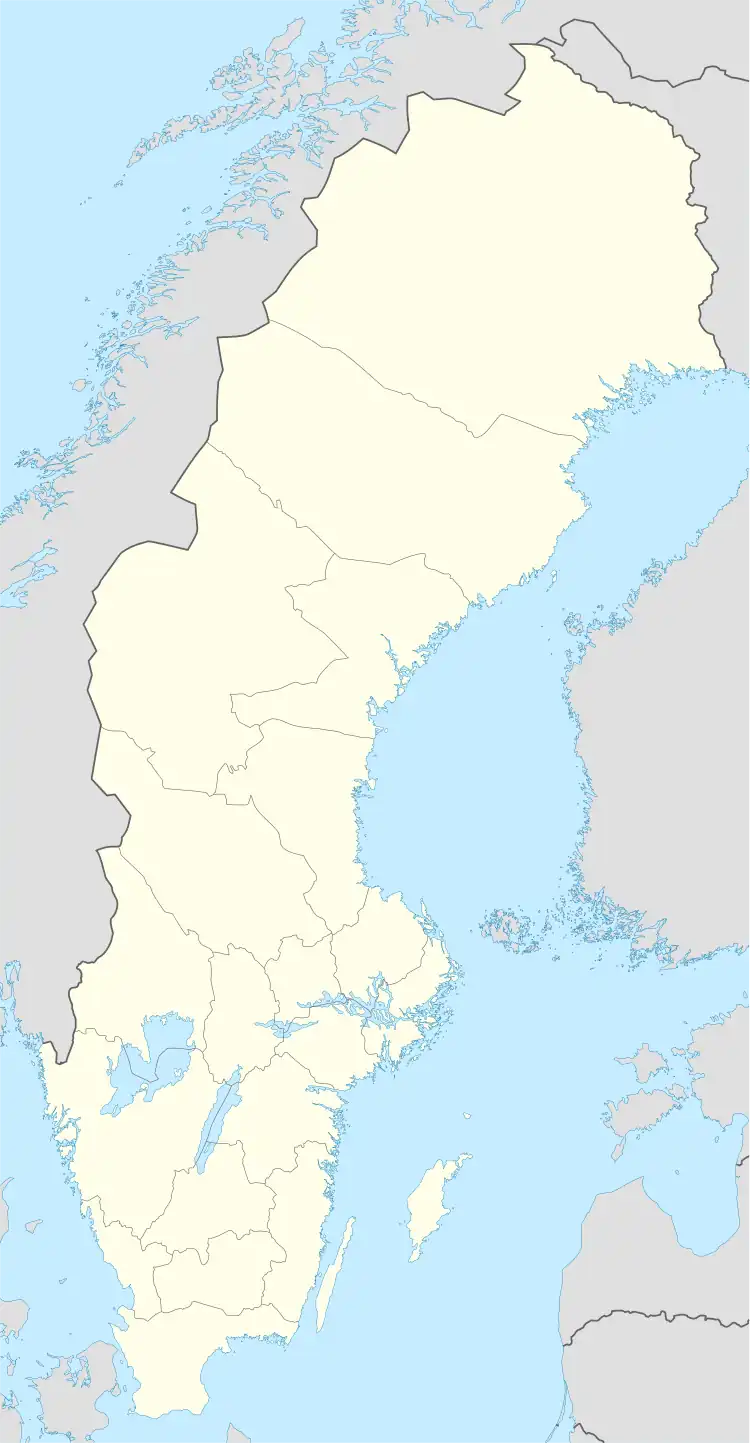Runtuna | |
|---|---|
 Runtuna  Runtuna | |
| Coordinates: 58°52′30″N 17°04′45″E / 58.87500°N 17.07917°E | |
| Country | Sweden |
| Province | Södermanland |
| County | Södermanland County |
| Municipality | Nyköping Municipality |
| Area | |
| • Total | 0.35 km2 (0.14 sq mi) |
| Population (31 December 2010)[1] | |
| • Total | 250 |
| • Density | 715/km2 (1,850/sq mi) |
| Time zone | UTC+1 (CET) |
| • Summer (DST) | UTC+2 (CEST) |
| Climate | Cfb |
Runtuna (local pronunciation Runntúna) is a locality situated in Nyköping Municipality, Södermanland County, Sweden with 250 inhabitants in 2010.[1]
Elections
Runtuna has an electoral ward part of the Nyköping East constituency. The area covers a larger landmass than Runtuna's locality area, being adjacent to the Runtuna parish and the church that is about 4 kilometres (2.5 mi) northwest of the village. It has also been merged with the electoral district of Ludgo, growing larger during the 1973-2018 period.
| Year | % | Votes | V | S | MP | C | L | KD | M | SD | ND | Other |
|---|---|---|---|---|---|---|---|---|---|---|---|---|
| 1973[2] | 95.8 | 530 | 3.2 | 30.8 | 46.0 | 5.7 | 3.6 | 10.6 | 0.2 | |||
| 1976[3] | 96.5 | 544 | 1.3 | 32.7 | 46.1 | 6.1 | 2.4 | 11.2 | 0.2 | |||
| 1979[4] | 95.7 | 559 | 2.9 | 34.2 | 37.0 | 7.3 | 2.1 | 15.9 | 0.5 | |||
| 1982[5] | 95.0 | 591 | 1.4 | 37.1 | 1.7 | 34.2 | 4.1 | 3.2 | 18.4 | 0.0 | ||
| 1985[6] | 93.3 | 591 | 2.9 | 34.3 | 1.9 | 31.1 | 9.3 | 20.3 | 0.2 | |||
| 1988[7] | 91.8 | 598 | 4.2 | 30.8 | 5.7 | 26.4 | 8.4 | 4.0 | 20.2 | 0.3 | ||
| 1991[8] | 89.0 | 599 | 2.3 | 27.5 | 3.3 | 20.7 | 6.7 | 10.2 | 19.5 | 9.5 | 0.2 | |
| 1994[9] | 90.0 | 595 | 5.0 | 36.5 | 6.4 | 20.2 | 3.9 | 5.2 | 20.8 | 0.3 | 1.7 | |
| 1998[10] | 83.1 | 914 | 7.9 | 29.4 | 4.6 | 16.8 | 2.5 | 15.6 | 22.5 | 0.5 | ||
| 2002[11] | 84.7 | 901 | 5.3 | 33.3 | 5.9 | 19.1 | 8.2 | 13.0 | 13.5 | 1.1 | 0.5 | |
| 2006[12] | 85.2 | 941 | 3.1 | 28.7 | 6.5 | 20.5 | 4.3 | 9.4 | 24.0 | 1.5 | 2.1 | |
| 2010[13] | 87.1 | 988 | 3.4 | 26.2 | 8.2 | 13.7 | 5.5 | 6.6 | 29.5 | 5.1 | 1.9 | |
| 2014[14] | 89.1 | 989 | 4.3 | 26.2 | 6.7 | 12.8 | 2.2 | 5.5 | 23.9 | 15.1 | 3.4 | |
| 2018[15] | 88.9 | 1,001 | 6.1 | 25.6 | 4.3 | 14.0 | 2.4 | 7.4 | 19.4 | 19.5 | 1.4 |
References
- 1 2 3 "Tätorternas landareal, folkmängd och invånare per km2 2005 och 2010" (in Swedish). Statistics Sweden. 14 December 2011. Archived from the original on 27 January 2012. Retrieved 10 January 2012.
- ↑ "Allmänna valen 1973" (PDF) (in Swedish). SCB.
- ↑ "Allmänna valen 1976" (PDF) (in Swedish). SCB.
- ↑ "Allmänna valen 1979" (PDF) (in Swedish). SCB.
- ↑ "Allmänna valen 1982" (PDF) (in Swedish). SCB.
- ↑ "Allmänna valen 1985" (PDF) (in Swedish). SCB.
- ↑ "Allmänna valen 1988" (PDF) (in Swedish). SCB.
- ↑ "Allmänna valen 1991" (PDF) (in Swedish). SCB.
- ↑ "Allmänna valen 1994" (PDF) (in Swedish). SCB.
- ↑ "Allmänna valen 1998" (PDF) (in Swedish). SCB.
- ↑ "Nyköping - summering" (in Swedish). Valmyndigheten.
- ↑ "Allmänna val 17 september 2006 - Nyköping" (in Swedish). Valmyndigheten.
- ↑ "Nyköping - Röster Val 2010" (in Swedish). Valmyndigheten.
- ↑ "Nyköping - Röster Val 2014" (in Swedish). Valmyndigheten.
- ↑ "Nyköping - Röster Val 2018" (in Swedish). Valmyndigheten.
This article is issued from Wikipedia. The text is licensed under Creative Commons - Attribution - Sharealike. Additional terms may apply for the media files.